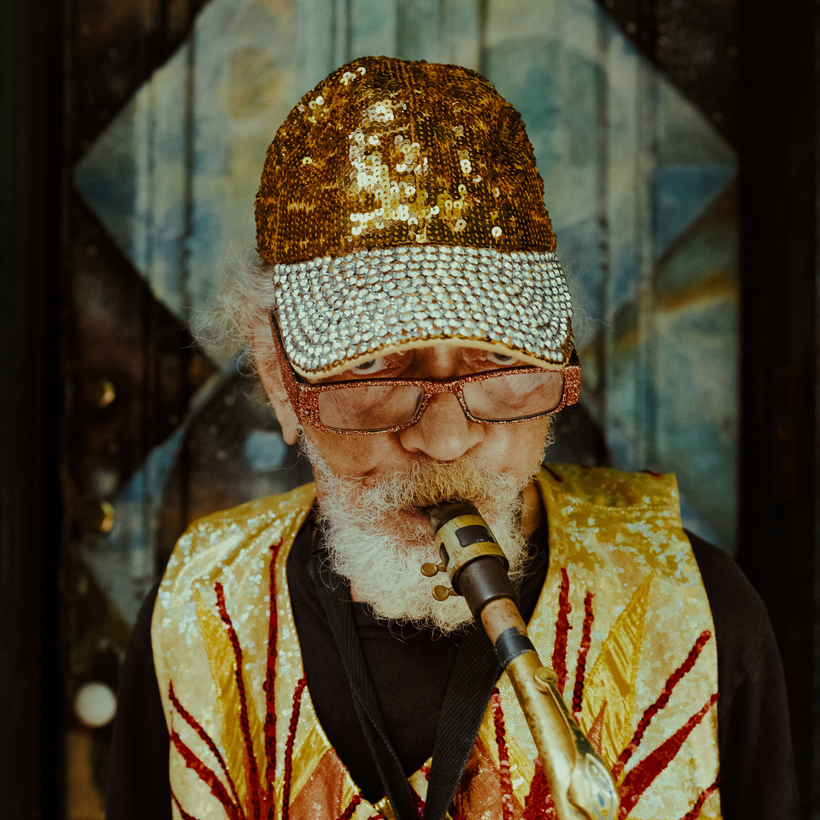On May 25, 2024, Marshall Allen turned 100 years old. Two days later, he entered Philadelphia’s Rittenhouse Soundworks studio to begin recording his debut solo album.
Born in Louisville, Kentucky, Allen moved to Philadelphia with his father in the late 1930s. At 18, he enlisted in the military and played alto saxophone and clarinet as a member of the 17th Division Special Service Band—part of the 92nd Infantry Division better known as “the Buffalo Soldiers,” the only all-Black unit to serve in Europe during World War II.
“When you’re young, you dream about being a hero and shoot-outs. I said, ‘If I can’t have a gun, I’m carrying a horn,’” Allen says. He was stationed in Germany and France, and when the war ended, the G.I. Bill paid for Allen to study clarinet under the renowned Ulysse Delécluse at the Paris Conservatory of Music.

Upon his return to America, Allen headed to Chicago and got a job working at a morgue to support himself while playing at jam sessions around the city. One day, club owner Joe Segal gave him a demo by a musician named Sun Ra—at the time a relative unknown living on the South Side—which changed the course of Allen’s life.
Ra, born Herman Blount, was a free-jazz visionary who fused Egyptian cosmology and Black nationalism into an all-encompassing philosophy and aesthetic. He took Allen on as a student in his nascent ensemble, the Arkestra, which is now considered one of the true watershed bands of the 20th century. However, in the late 1950s, little money was earned by the struggling avant-garde group.
Allen was committed to his cosmic teacher—Ra claimed to be an alien from Saturn who traveled to Earth on a peace-preaching mission—and toughed it out in Chicago, before a move to New York found the band embraced by the downtown underground art scene.

Finally, the Sun Ra Arkestra settled in a communal house in Allen’s hometown of Philadelphia, with Allen acting as Ra’s loyal second-in-command. They flourished throughout the 70s, 80s, and 90s, and recognition of the band’s seismic influence on music and culture finally became widespread. Parliament-Funkadelic, Grace Jones, and even Beyoncé are all in debt to Ra’s synthesizing of African-diaspora culture with science-fiction—what became known as Afrofuturism—through experimental jazz.
Ra claimed to be an alien from Saturn who traveled to Earth on a peace-preaching mission.
On May 30, 1993, Ra passed away at 79, and in 1995, Allen became the Arkestra’s full-time bandleader, a position he’s held ever since, playing alto sax, flute, oboe, and piccolo. He’s also been a pioneer of the E.W.I.—the electronic wind instrument—which is to woodwinds what the synthesizer is to the piano.
“Marshall really took over the operation with such elegance, protecting their legacy but also continuing to make vital work,” says Harper Simon, the son of Paul Simon, who tapped Allen to collaborate on his 2022 album and multi-media project, Meditations on Crime. Simon, who got a chance to visit the Arkestra house, says, “It was like stepping back in time, into the Afrofuturist jazz compound of my dreams.”

On February 14, Allen released New Dawn via Germany’s Week-End Records—the first studio album under his own name. Featuring the centenarian’s masterfully spacey work with his E.W.I., the lovely lead single “African Sunset” sounds like a bossa nova band playing aboard the Starship Enterprise. Neneh Cherry—stepdaughter of jazz trailblazer Don Cherry—lends her distinctive voice to the album’s centerpiece title track, a deliciously dreamy ballad. After 100 trips around the sun, Allen hasn’t slowed down creatively one bit.
Spike Carter is a writer and filmmaker


